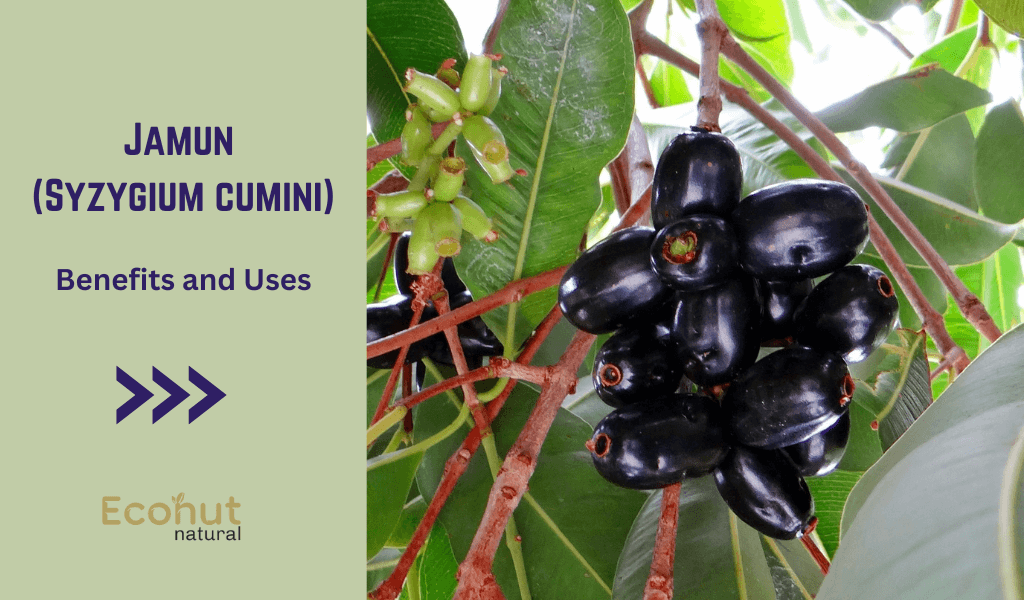Syzygium cumini, commonly known as the Java plum, Indian blackberry, or Jamun, is a tropical tree native to the Indian Subcontinent, Southeast Asia, and surrounding regions. It belongs to the flowering plant family Myrtaceae. The tree is known for its small, sweet, and sour fruit, which is often used in various culinary preparations and traditional medicine.
As a rapidly growing species, it can reach heights of up to 30 m (100 ft) and can live more than 100 years. Its dense foliage provides shade and is grown just for its ornamental value. At the base of the tree, the bark is rough and dark grey, becoming lighter grey and smoother higher up. The wood is water resistant after being kiln-dried. Because of this, it is used in railway sleepers and to install motors in wells. It is sometimes used to make cheap furniture and village dwellings, though it is relatively hard for carpentry.
Scientific Classification of the Jamun (Syzygium cumini)
| Kingdom | Plantae |
| Family | Myrtaceae |
| Order | Myrtales |
| Species | Syzygium cumini |
| Genus | Syzygium |
| Phylum | Angiosperms |
| Class | Eudicots |
Names of Jamun (Syzygium cumini)
Bengali name: Kala jam
Punjabi name: Jamalu
Latin name: Syzygium cumini
English name: Java plum, Black plum
Hindi name: Jamun, Jambol, Jambul
Telugu name: Neredu, Chettu
Tamil name: Saval naval
Malayalam name: Naval
Kannada name: Nerale
Benefits of Jamun (Syzygium cumini)
The fruit, also called jamun, has several potential health benefits, owing to its rich nutritional profile and various bioactive compounds.
Rich in Antioxidants:
Jamun is a good source of antioxidants, particularly anthocyanins, flavonoids, and phenolic compounds. These antioxidants help in scavenging free radicals in the body, thereby reducing oxidative stress and lowering the risk of chronic diseases like cancer and heart disease.
Regulates Blood Sugar:
Jamun has been traditionally used in Ayurvedic medicine for its antidiabetic properties. Research suggests that jamun may help regulate blood sugar levels by improving insulin sensitivity and increasing glucose uptake by cells. It may also inhibit enzymes involved in carbohydrate metabolism, thus controlling blood sugar spikes.
Skin Benefits:
Jamun contains vitamins A and C, along with other nutrients that are beneficial for skin health. These nutrients help in maintaining healthy skin, preventing premature aging, and promoting skin repair and regeneration.
Boosts Immunity:
The presence of vitamins, minerals, and antioxidants in jamun can help strengthen the immune system, making the body more resilient to infections and diseases.
Weight Management:
Due to its low calorie and high fiber content, jamun can be included in weight loss diets. The fiber helps promote satiety, reducing overall calorie intake, while the low glycemic index of jamun makes it suitable for individuals trying to manage their weight or diabetes.
Potential Anti-cancer Properties:
Some preliminary studies suggest that certain compounds found in jamun may possess anti-cancer properties by inhibiting the growth of cancer cells. However, more research is needed to understand the mechanisms and potential applications in cancer prevention or treatment.
Improves Digestive Health:
The fruit and seeds of jamun contain dietary fiber, which aids in digestion and prevents constipation. Additionally, jamun possesses astringent properties that may help alleviate diarrhea and other gastrointestinal issues.
Heart Health:
Jamun may contribute to heart health by reducing cholesterol levels and improving lipid profile. The antioxidants present in jamun help prevent the oxidation of LDL (bad) cholesterol, thereby reducing the risk of atherosclerosis and cardiovascular diseases.
Anti-inflammatory Properties:
Some studies suggest that jamun exhibits anti-inflammatory effects, which may help alleviate inflammation-related conditions such as arthritis, gout, and other inflammatory disorders.
Properties
Hindi / Sanskrit
- Rasa, Kashaya, Madhur, Amla
- Guna, Laghu, Ruksha
- Virya, Sheet
- Vipaka, Katu
English
- Taste, Astringent, Sweet, Sour
- Physical Property, Light, Dry
- Poteny, Cold
- Metabolic Property , Pungent
(After Digestion)
Part Used
- Seeds
- Fruit
- Leaf
- Bark
Dosage
Fresh Fruit Consumption:
Eating fresh jamun fruit in moderate amounts is safe for most people. Aim for 5-10 berries per day as a general guideline.
Jamun Supplements:
If you’re considering jamun supplements, such as capsules or tablets, it’s crucial to follow the recommended dosage provided on the product label or as directed by your healthcare provider.
Consultation with a Healthcare Provider:
If you have any underlying health conditions or are taking medications, it’s essential to consult with a healthcare provider before incorporating jamun into your diet or using it in any concentrated form.
Jamun Juice:
Some people also consume jamun juice for its health benefits. If you’re drinking jamun juice, it’s essential to dilute it with water, as the concentrated juice may be too strong and could cause digestive discomfort in some individuals. Start with small amounts, such as half a glass per day, and gradually increase as tolerated. 10-20 ml.
Jamun Seed Powder:
Jamun seed powder is also used in some traditional medicine practices. However, the dosage and usage of jamun seed powder should be guided by a qualified healthcare practitioner, as consuming excessive amounts may have adverse effects. Seed Powder 1-3 gm.
Also More: Agastya (Sesbania grandiflora): Uses, Benifits, Dosage and Properties
Jamun (Syzygium cumini) Side Effects
While jamun (Syzygium cumini) is generally considered safe for consumption when eaten in moderate amounts. There are lots of benefits for using Jamun (Syzygium cumini). We discuss some of the most important benefits are below.
Kidney Stones:
There is limited evidence suggesting that excessive consumption of jamun seeds may contribute to the formation of kidney stones in susceptible individuals. The seeds contain certain compounds that could potentially increase the risk of stone formation, particularly oxalate. However, more research is needed to establish a definitive link.
Pregnancy and Breastfeeding:
Pregnant or breastfeeding women should consume jamun cautiously and in moderation. While jamun fruit is generally safe, there’s limited research on its effects during pregnancy and lactation. It’s always best to consult with a healthcare provider before adding new foods to your diet during these periods.
Interactions with Medications:
Jamun may interact with certain medications, particularly those used to lower blood sugar levels (antidiabetic drugs). Concurrent use of jamun and these medications could potentially lead to hypoglycemia. If you’re taking any medications, especially for diabetes or other health conditions, it’s essential to discuss the potential interactions with your healthcare provider before consuming jamun regularly.
Allergic Reactions:
Some individuals may be allergic to jamun fruit or other parts of the plant. Allergic reactions can manifest as itching, swelling, hives, or even anaphylaxis in severe cases. If you experience any allergic symptoms after consuming jamun, it’s essential to seek medical attention promptly.
Hypoglycemia:
Jamun is known for its potential to lower blood sugar levels, which can be beneficial for individuals with diabetes. However, if you already have low blood sugar levels (hypoglycemia), consuming jamun or jamun-based products could further reduce your blood sugar to dangerously low levels. People taking medications or insulin to lower blood sugar should monitor their levels closely when consuming jamun and consult with a healthcare professional to adjust their medication dosage if necessary.
Gastrointestinal Issues:
Some individuals may experience digestive discomfort such as stomach upset, diarrhea, or abdominal pain after consuming jamun, especially if eaten in large quantities or if they have a sensitive stomach.
Cunclusion
Jamun (Syzygium cumini) is a nutritious tropical fruit known for its unique flavor and potential health benefits. While generally safe for consumption, allergic reactions, hypoglycemia in diabetic individuals, gastrointestinal discomfort, and potential kidney stone formation from excessive seed consumption are possible side effects.
Pregnant or breastfeeding women should consume jamun cautiously, and individuals taking medication for diabetes should monitor their blood sugar levels closely. Consulting with a healthcare professional before adding jamun to the diet is advisable, especially for those with existing health conditions or concerns.
FAQS
Can jamun help with diabetes?
Some research suggests that compounds present in jamun may help improve insulin sensitivity and regulate blood sugar levels. However, more studies are needed to confirm its effectiveness and determine the appropriate dosage for managing diabetes.
Are there any side effects of consuming jamun?
Excessive consumption of jamun may cause gastrointestinal discomfort such as diarrhea or stomach upset in some individuals. Jamun seeds contain alkaloids, which in large amounts, may have toxic effects. It’s essential to avoid consuming excessive amounts of jamun seeds.
Can jamun be beneficial for skin and hair health?
The antioxidants present in jamun may help protect the skin from oxidative stress and premature aging. Some traditional practices suggest using jamun seed oil for promoting hair growth and improving scalp health, although scientific evidence supporting this is limited.

